15th anniversary
Celebrating 15 Years
of Intellectual Property &
Social Justice CLE
“The IP and Social Justice CLE Program was established and has been sustained by members of the Bench, Bar, and corporate and institutional supporters who envision the principles of access, inclusion, and empowerment as inherent to the social function of IP protection. This annual exploration of cutting edge developments in IP law, informed by consideration of social justice issues, is fittingly enriched by the most consistently diverse congregation of CLE IP faculty and attendees in the nation. It is a privilege to be a part of this enduring, collaborative effort to assist IP lawyers in achieving the Houstonian professional equipoise of technical proficiency in service to the greater societal good.”
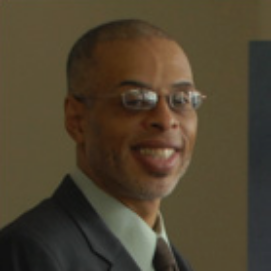 - Professor Lateef Mtima
- Professor Lateef Mtima
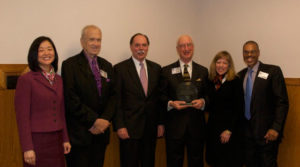
Much of Howard University’s history is about courageous people who put their lives on the line to open the door to opportunity not just for some people but for all. Intellectual property is all about opportunity and the protection of individual rights—opportunity based not on your ethnicity or your sexual preference, or the color of your skin, your religious beliefs, or your station in life, but instead on your creativity, your ingenuity, your intellect, and your abilities. Intellectual property is about opportunity and protecting the creative rights of all people, whoever they might be. In that sense, intellectual property has much in common with the struggle for social justice. I congratulate Howard University and Professor Lateef Mtima, the Founder and Director of the Institute for Intellectual Property and Social Justice, for fifteen years of excellence in educating the future leaders of the intellectual property bar. – Judge Richard Linn
Thoughts from Those There at the Beginning
Read more about the start of the CLE program here.
15 years ago, Howard University School of Law was pretty much an unknown on the IP front. But under the leadership of Professor Mtima and others at Howard, the IP and Social Justice CLE was inaugurated. Outside lawyers and distinguished members of the Judiciary have volunteered their time to the CLE to greatly increase the IP profile of Howard. For me, it has been enormously satisfying to watch this growth. May it continue. – Thomas Irving
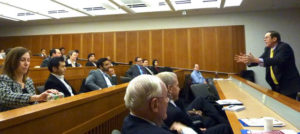
From inspirational vision of Professor Mtima and so many others at Howard University School of Law, we celebrate the 15th Anniversary of IIPSJ’s Annual IP and Social Justice conference. The conference has benefitted from the staunch support of judges, corporate counsels, outside counsels, and of course the fabulous Howard law students. It has been an absolute privilege and honor serving as the Chair of this conference and witnessing its growth over the years. Congratulations on the 15th Anniversary! – Esther Lim
I had the honor of being part of the creation of the Institute and the many wonderful “firsts” - the first CLE program, The first internship at Finnegan Henderson, the first special edition of the law journal, the first visit to the chambers of the CAFC, the first WIPO attendance etc. - It was a tremendous amount of work for an ever evolving cause with countless unanticipated rewards that flow-through my career and life. In fifteen short years, Institute has had an immeasurable impact on a macro and micro level on society, law, lawyers, entrepreneurs, inventors, creators and justice and has enabled me to work to leave a legacy that will inspire future generations. I am forever grateful. – Tameka Simmons
___________________________________________
IP & SOCIAL JUSTICE THROUGH THE YEARS
Through tireless efforts of Prof. Mtima most especially, but also through the supportive and independent efforts of many the others including especially those who have supported and continue to support IIPSJ, the social justice perspective has now worked its way into the very fabric IP discourse and reform at all levels of IP law, policy, advocacy, and administration. I have been most pleased to have been able to contribute to this project for the past 15 years and plan to continue to do so for awhile yet. – Steven Jamar
2007 Intellectual Property and Social Justice Symposium
Introductory Remarks: Applying the Intellectual Property Law in the Public Interest: Copyrights And the Public Use of Software
Presentation: Granting Patents Based On Race: The Practitioner’s Role in Shaping Social Policy
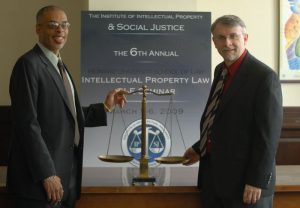
2009 Intellectual Property and Social Justice Symposium Presentation: Where Intellectual Property Theory Meets ‘Outsider’ Jurisprudence–What African-American Cultural Production Can Teach IP Policy

2011 Intellectual Property and Social Justice Symposium Presentation: Intellectual Property and the Pursuit of Civil Rights: Issues & Challenges for the Digital Information Age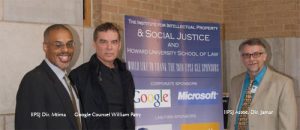
2014 Intellectual Property and Social Justice Luncheon Presentation: Intellectual Property Social Justice: Civil Rights and Economic Empowerment in the 21st
It has been my honor and privilege to participate in Howard’s IP and Social Justice CLE for more than ten years. This is the only CLE of which I am aware that is focused on highlighting the intersection of intellectual property and social justice. It is through this CLE and other work that IIPSJ demonstrates a commitment to ensuring equal access to our intellectual property systems, domestically and abroad. - Toni Y. Hickey
2017 Intellectual Property and Social Justice Luncheon Keynote: Property, Intellectual Property, and Social Justice: Mapping the Next Frontier
CLE Impact & Opportunities
The CLE programs help HUSL alumni and other practitioners develop and maintain expertise in IP practice and provide opportunities for experienced minority IP lawyers to demonstrate their expertise to an audience they might not otherwise reach. The CLE programs also provide networking opportunities for lawyers from diverse groups including attorneys from private practice, from government, from the judiciary, and from academia.
Having attended Howard University School of Law and entered into the IP profession as a patent attorney prior to the establishment of the IP & Social Justice CLE Program, I am so very honored and proud to see the impact that it has had on the students and the IP community as a whole by providing opportunities that previously were hard to come by or not available at all for diverse lawyers in IP law. – Jennifer M. Hayes
As a proud member of the class of 2005… I continue to take pride in this program as an essential element of my continuing legal education. The CLE is uniquely rooted in Howard’s mission of social justice, offering invaluable insights from esteemed members of the bar and bench. I am honored to join the 15th year of this program, and I look forward to returning for many years to come. – Idris McKelvey
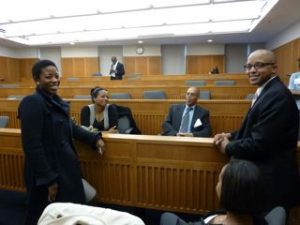
The IIPSJ CLE event has been essential in helping to direct the trajectory of my career. Every year I have participated, through the various modules and panel discussions, I walked away with a solid grasp of the current trends in the profession. Moreover, I emerged with an understanding of the future direction of the profession. Thus, I have been able to align my professional experiences with the ever evolving field of Intellectual Property. – Ulysses Williams
I came to Howard Law School with the intent to use my law degree to effect change... Attending the IP & Social Justice CLE program ... I gained a clearer understanding of the intellectual property-related social justice issues not only concerning disenfranchised people in the United States, but around the world. It is an invaluable program and service to the larger community. – Aisha (Williams) Cassis
Prior to attending law school, I spent more than a decade in the biotechnology arena as a scientist. When I entered Howard University School of Law in 2013, I knew that I wanted to be a patent attorney, however, I did not have a strong network of mentors in the patent field. I quickly joined the Howard University School of Law, Intellectual Property Student Association, and benefited from the mentorship of Professor Lateef Mtima. By attending the IP & Social Justice CLE Program each year, I was afforded the unparalleled opportunity to forge new mentoring relationships with practicing attorneys in the IP arena, and learn about emerging IP issues. This unique experience helped guide my career and continues to do so. Currently, I am a second year associate at Finnegan, Henderson, Farabow, Garrett & Dunner, LLP. – Candice R. Jones
Phil Hampton has graciously volunteered his time to participate in the CLE every year.
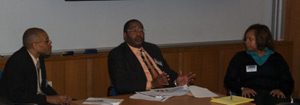
As a student here I benefited from mentoring by Professor Mtima and participation in the CLE, and soon found my passion in the practice of trademark law. By participating as an attorney, I am able to stay up to date and involved with issues of intellectual property and social justice; while continuing the tradition of mentoring the students I meet each year. Congratulations on 15 years and I look forward to the next 15 and many more! – Tashia Bunch
Fair Use & Creative Control
Copyright in the Community: From Fair Use to Creative Control
This month we’d like to discuss some updates in the area of fair use and also invite you to the official launch of Creative Control, the IP community education and pro bono advice initiative.
What is Fair Use?
Fair use is a legal doctrine within the copyright law that allows the public to use copyrighted works and material without the permission of the copyright owner. The fundamental social purpose of copyright protection is to promote the progress of the arts and sciences: to advance American learning and culture by encouraging authors and other creators to share their works with the public. Consequently, copyright reserves to authors only certain specific uses of their works, such as making a copy, while all other uses, such as reading a book aloud as a bed-time story, are freely available to the public. In addition, fair use allows the public to also engage in the authors’ reserved uses, typically referred to as the authors’ exclusive rights, when allowing the activity promotes the social purpose of copyright.
For example, while making a copy of a work is an exclusive right, it would undermine the purpose of copyright if authors could always control whether their work, or any part of their work, can be copied. Without the fair use doctrine, the author of a news article or a history book could prevent a teacher from copying any part of a copyrighted work for use in a classroom discussion. Similar uses by the public, such as reproducing works for purpose of literary or public criticism or social activism, or reproducing portions or aspects of works to create new works such as “fan fiction”, are other activities that are dependent upon fair use.
Fair Use Recent Court Decisions
Some recent court decisions demonstrate the importance of fair use to the creation of new works and art forms and to free speech. In Drake Winning Sampling Case Over Fair Use Is Big News... But Still Demonstrates The Madness Of Music Licensing, Mike Masnick discusses how courts are reevaluating hip-hop sampling as fair use of portions of pre-existing music. In Reaction video YouTubers win landmark ‘fair use’ copyright case in the US,” Heather Gay discusses how a court recently held that a YouTube “reaction video”, video wherein viewers of various Internet videos share their opinions of these works, was protected by fair use.
For more information on how courts have applied fair use, visit the Fair Use Index on the U.S. Copyright Office website. The index is a searchable database of court decisions on fair use compiled to aid the public in understanding the types of uses that have previously been determined to be fair use. For more information on criticism and commentary as fair use, check out “Copy This Podcast Episode 9: Parody Isn’t Always a Laughing Matter.”
Fair Use and Halloween (and other uses…)
In light of the past week’s festivities, you might find interesting a recent op-ed by Joshua Lamel, Fair Use and Halloween, which discusses how fair use supports this All Hallowed American pastime.
Is there an IP social justice development or issue that you think might interest other IIPSJ readers? Please let us know - and as always, we look forward to your comments and questions.
IIPSJ
Creative Control
The Lawyers’ Committee invites you to the launch of Creative Control - an initiative to elevate and empower online expression. The event will feature local DC artists, thought leaders on protecting your creative works, and one-on-one free advice with attorneys.
The event takes place Thursday, November 16 from 7 -10 pm at RedRocks on H St in NE DC.
Other Programs
Other IIPSJ Education and Outreach Programs
From its inception in 2002, IIPSJ has conducted programs to reach out to the bench and bar and to government officials through workshops and seminars as well as through participation in professional organizations such as the Giles Rich Inn of Court and the American Intellectual Property Association. One of IIPSJ's earliest conferences was a continuing legal education program designed for lawyers and judges. The CLE has been done annually ever since.
Over the years IIPSJ has sponsored or participated in various outreach initiatives and programs to educate undergraduates and community members about IP and its opportunities. This aspect continues to grow through partnering with the NAACP, the USPTO, Sramani, and with other organizations for particular programs. Below is information on current and some past programs that IIPSJ has sponsored or participated in.
Net Neutrality
Over the summer, you likely noticed an increase in webpages and social media posts on Net Neutrality. And when you visited various webpages on July 12 you may have seen ads supporting the Internet wide day of action to save net neutrality.
IP Symposium: Best Practices in Rights Clearance
As we all welcome the New Year IIPSJ continues its collaborative work in community IP education and empowerment initiatives as a co-sponsor of
Presented by the Center for Protection of Intellectual Property at the Anton Scalia Law School at George Mason University, on Thursday, January 18, 2018, beginning at 1pm.
This symposium will bring together scholars, industry representatives, and visual artists to discuss when and whether rights need to be cleared when using the work of others. During the networking reception to follow, students from the Arts & Entertainment Advocacy Clinic at the Scalia Law School will be available to consult one-on-one with attendees about copyright questions they may have and to otherwise facilitate further consultation with the Washington Area Lawyers for the Arts and other Volunteer Lawyers for the Arts organizations.
Please visit the link here at Center's website for further information and to register for the Symposium.
International IP
1. Copyright Implications of Renegotiating the North American Free Trade Agreement (“NAFTA”) – In May 2017, the United States Trade Representative (“USTR”) published a request for comments on the Trump administration objectives for renegotiation of NAFTA. Here are links that discuss some of the comments submitted on copyright and social justice concerns.
Re:Create Coalition: What They’re Saying: Protecting A Balanced Copyright System In NAFTA Renegotiations
Program on Information Justice and Intellectual Property (“PIJIP”): Copyright Balance as a NAFTA Negotiating Objective: Testimony to the Trade Policy Staff Committee
Creative Commons: Is Re-negotiating NAFTA Opening Pandora’s Box?
2. Updates on the Marrakesh (“Books for the Blind”) Treaty – In May we included an article announcing that the Electronic Information for Libraries (“EIFL”) library guide to the Marrakesh Treaty for persons with print disabilities is now available six languages: English, French, Lithuanian, Russian, Serbian, and Nepali. This month we bring some links for background on the treaty as well as an update on the status in the EU.
World Intellectual Property Organization (“WIPO”): The Marrakesh Treaty In Action
WIPO: Stevie Wonder to UN Member States: Help Others Beat the Odds Like I Did, Join Marrakesh Treaty
Intellectual Property Watch: EU Parliament Adopts Marrakesh Treaty; Blind Union Prepared To Fight Publisher ‘Compensation’
3. Copyright Reform in South Africa - The South African Parliament published a pending Bill amending the Copyright Act and a request for comments. Click here to read the pending Bill.
IP Watch: Lessons From South Africa: Protecting Non-Expressive Uses In Copyright Reform
Infojustice: Comments on South Africa's Copyright Amendment Bill (B13-2017)
4. Other Articles of Interest
Infojustice, reposted from EIFL: Course Packs for Education Ruled Legal in India
Public Knowledge: Net Neutrality Challenges in the World: Zero-Rating in the European Union
Reposted by Infojustice: German Federal Court of Justice Grants Compulsory License in Preliminary Proceedings
IIPSJ
Matal Tam
Matal v. Tam
On Monday, June 19, 2017, the Supreme Court held that the law prohibiting the federal registration of disparaging trademarks, part of Section 2(a) of the Lanham Act, was unconstitutional as viewpoint discrimination prohibited by the First Amendment guarantee of freedom of speech. Matal v. Tam, https://www.supremecourt.gov/opinions/slipopinion/16. The Court ruled 8-0 on the result and 8-0 on the theory of viewpoint discrimination, but split on a number of other issues considered by the Court. The social justice implications of this decision fall along several lines.
First, those who seek to "reclaim" disparaging words like "dykes" and "slants" will be able to use federally registered trademarks in support of their efforts to do so. This is empowering to such advocates. While some advocates of such "reclamation" strategies may find the Tam decision empowering, some other social justice advocates have raised competing concerns.
Second, the federal government will no longer be able to reject trademarks because they disparage a group or person. Trademarks like, STOP THE ISLAMISATION OF AMERICA, which the Federal Circuit (“CAFC”) previously affirmed a refusal to register the mark because it disparaged the Muslim community. Those with power and money are most likely to be able to exploit this change thereby further legitimating disparaging discourse not just in general, but also in the marketplace.
Third, the Court continues to support hate speech while ignoring the adverse impacts of it even in a quintessential commercial type of speech like trademarks.
Fourth, the implications of the Court's continuing shift toward formulaic evaluations of subtle freedom of expression issues signaled both in Reed v. Town of Gilbert from 2015 and in this case are troubling insofar as it results in more rigid rules with less room for balancing legitimate, strong, and even compelling interests against the extremely important, but not unlimited, right of freedom of expression.
Now that the disparagement provision has been struck down by the Supreme Court, we hope that Congress will work on a new version that can pass constitutional muster.
Many are also wondering how much of Section 2(a) of the Trademark statute, which also includes a ban on trademarks that are immoral or scandalous, will survive this decision. A decision from the CAFC may answer this question in the suspended case In re Brunetti, which appeals the TTAB decision affirming a refusal of FUCT under the scandalousness provision of the statute.
And we plan to continue the debate as well. We expect to have a lively panel discussion on this topic at our 2018 CLE program. And our own Professor Steven Jamar, who serves as the Institute’s Associate Director for International Programs, is currently preparing a journal article on the decision.
Below we have included links to recent articles further discussing the decision. And we invite you to post comments and questions on our Facebook page.
IIPSJ
Articles of interest on Matal v. Tam
https://ucsocialjustice.com/2017/06/23/supreme-court-offensive-speech-may-be-trademarked/#more-2883
Send an email to updates@iipsj.org with SUBSCRIBE in the subject line to receive these updates to your inbox.
Copyright Office Comments & Race
Copyright Office Comments & Race + IP Summit
Also, as a reminder, IIPSJ is a co-sponsor for the RACE + IP Summit held at Boston College April 20-22. The conference will feature five plenary sessions which develop and engage the subfield of critical race IP, concurrent sessions with scholars across disciplines conducting multimethodological research, roundtable discussions on special topics related to race and intellectual property (e.g. the intersections of social media, algorithmic culture, and racial justice), and a special presentation by Chinatown Dance Rock band and trademark renegades, The Slants. Accepted participants will be invited to participate in these and other conference events, including a Saturday evening dance party cocktail reception.
Copyright & Social Justice Podcast
We thought the following might be of interest to you:
1) IISPJ’s Director, Lateef Mtima, is a guest on the recent edition of the CopyThis podcast hosted by Kirby Ferguson and presented by the Re:Create Coalition. You can find the podcast along with a full description here on the Re:Create Coalition website. A portion of the description is reproduced below.
Copy This Podcast Episode 5: Copyright Drives the Beat of Social Justice
“…While many may think about copyright law in terms of music, books and movies and how to access them, Lateef Mtima, Professor of Law at the Howard University School of Law and Founder and Director of The Institute for Intellectual Property and Social Justice, points to the Constitution to remind listeners that copyright’s “most important function is to provide people with knowledge, to educate themselves… to share ideas and information.”…
From the Black Lives Matter movement, to the high profile “Blurred Lines” case that has pitted Robin Thicke and Pharrell Williams against Marvin Gaye’s estate, and even led to varying opinions across the full spectrum of the copyright community, Lateef helps bring to light copyright discussions that are playing out in communities and the courts in real time today so be sure to tune in.”
2) http://www.eifl.net/news/eifl-marrakesh-guide-launches-nepali
Please see the following information from EIFL on the Marrakesh Treaty:
EIFL is delighted to announce that our popular library guide to the Marrakesh Treaty for persons with print disabilities is now available in Nepali, bringing to six the total number of languages for the guide.
The Marrakesh Treaty, which entered into force in September 2016, gives organizations like libraries the right to reproduce printed works in accessible formats like braille and audio, and to exchange these works across national borders. EIFL has been a strong advocate for ratification of the Marrakesh Treaty and its implementation into national law.
‘The Marrakesh Treaty: an EIFL Guide for Libraries’ is a key resource for librarians supporting ratification and national implementation of the Treaty. The guide provides a straightforward introduction to the Treaty and its key provisions, and concrete recommendations for implementation in order to maximize accessible reading materials available through libraries.
In addition to the new Nepali version, EIFL has published the guide in English, French, Lithuanian, Russian and Serbian.
EIFL would like to thank Mr Pratyush Nath Upreti and colleagues at Upreti & Associates for translating the EIFL Marrakesh guide and for invaluable assistance in producing the Nepali version. We hope it will be a useful resource for librarians, the visually impaired community and policy-makers who are working towards ratification of this important Treaty.
Visit EIFL Resources to download The Marrakesh Treaty: an EIFL Guide for Libraries (Nepali)
3) On April 26 WIPO celebrated World IP Day. This year’s theme was Innovation – Improving Lives. On the WIPO website you can find videos on the topic, including videos by WIPO Director General Curry and innovators such as Consuelo Cano Gallardo, inventor of a downhill skateboard and Arthur Zang, inventor of a cardiac care tablet.
Update on H.R. 1695
Update on H.R. 1695: Should the Register of Copyrights Become a Political Appointee?
For those not familiar with the Register of Copyrights Selection and Accountability Act (H.R. 1695) this Legislative Bill would extinguish the authority of the Librarian of Congress to appoint the Register of Copyrights, a responsibility that the Librarian has held since 1870. There has been relatively little public discussion of the Bill – in fact it has already passed in the House of Representatives. If the Bill is passed by the Senate, the power to appoint and dismiss the Register would shift to the President.
Supporters of the Bill argue that removal of the Librarian’s appointment power is necessary to modernize the Copyright Office. Among the questions that have been raised by the Bill’s proposal, however, is how modernization of the Copyright Office would be aided by making the Register’s appointment a political process. Given the Constitutional directive that the primary function of copyright is to serve the national interest in promoting the progress of the arts and sciences, it seems reasonable to expect that the expert entrusted with curating the national repository of knowledge and culture would also be well-qualified to appoint a Register capable of serving the public interest in the modern administration of the copyright system.
The actual text of H.R. 1695 does not enumerate modernization of the Copyright Office as one of its objectives. Consequently some critics urge that the Bill is actually an effort to benefit the Content Industries at the public’s expense. “This bill serves no purpose other than to take power away from the Librarian of Congress and give it to powerful lobbyists, who will have a major say in who runs the Copyright Office,” writes Michael Masnick on TechDirt.com. “It’s…a gift to Hollywood.” Other critics argue that the Bill is a veiled attack on the current Librarian. According to Laura Burke of NewsOne Now, “President Barack Obama appointed [Dr. Carla] Hayden the 14th Librarian of Congress on February 24, 2016. She is the first African American to hold the position, as well as the first woman to be the Librarian of Congress….On March 23, legislation was introduced to block Hayden from appointing the next Register of Copyrights.”
Both supporters and opponents seem to agree that Dr. Hayden’s reassignment of former Register Maria Pallante, who subsequently resigned, is one issue at the heart of the controversy. In an article in The Hill, H.R 1695 supporters Dina LaPolt and John Meller write that “[T]he Librarian of Congress…is rarely … in tune with copyright issues…to put it mildly…. [L]ast year, without warning or justification, the Librarian fired Register Maria Pallante, long heralded as a fantastic Register and advocate for strong copyright protection.” While serving in her position, Register Pallante publicly expressed the view that “Copyright is for the author first and the nation second.”
Given the important public interest functions that both the Librarian and the Register embody in the copyright system, H.R. 1695 raises important issues of copyright social justice. Attached below is a link to the text of the Bill, as well as links to various commentaries in support of and in opposition to the proposed legislation.
We invite you to post comments and questions on our Facebook page.
IIPSJ
H.R. 1695 Bill Text
https://www.congress.gov/bill/115th-congress/house-bill/1695/text
Commentaries in support of H.R. 1695
Commentaries in opposition to H.R. 1695
http://shareblue.com/house-gop-seizes-power-from-first-black-female-librarian-of-congress/
http://www.blackpressusa.com/house-votes-to-limit-powers-of-first-black-librarian-of-congress/
Send an email to updates@iipsj.org with SUBSCRIBE in the subject line to receive these updates to your inbox.
